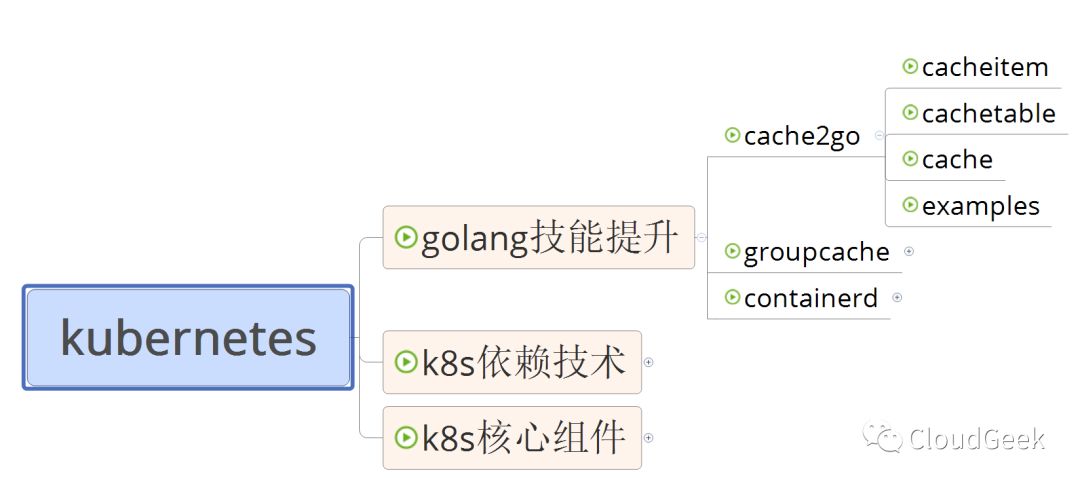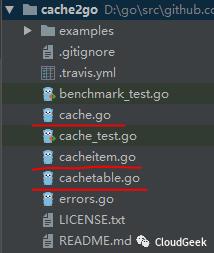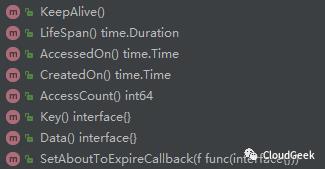启航 - cache2go源码分析
Posted cloudgeek
tags:
篇首语:本文由小常识网(cha138.com)小编为大家整理,主要介绍了启航 - cache2go源码分析相关的知识,希望对你有一定的参考价值。
一、概述

我们今天开始第一部分“golang技能提升”。这一块我计划分析3个项目,一个是很流行的golang源码阅读入门项目cache2go,接着是非常流行的memcache的go语言版groupcache,最后是docker项目中分出来的核心组件之一containerd,通过这3个项目的源码全解析来达到golang能力上一个台阶的目的。
在本系列教程的学习过程中,我希望你能够做到如下要求:如果你是一个go语言新手,在看下面的代码分析过程中你肯定会遇到一些自己陌生的编码方式、陌生的知识点,这个过程中我希望你遇到一个点掌握一个点,比如看到下面的代码用到了锁,就去找各种资料把锁相关的知识点学了。看到回调函数,就思考一下人家为什么这些地方都使用回调函数,有什么好处。这样在看完这个项目源码分析后,你就能学到一部分知识模块
二、cache2go是什么
这是一个在github上开源的项目,原作者这样介绍:
Concurrency-safe golang caching library with expiration capabilities.
看懂了吗?简单说就是有心跳机制的并发安全的go语言缓存库。ok,下面我们要分析的这个项目是一个缓存库,并且有2大特性,并发安全和心跳机制!
三、项目结构

项目目录结构如上图所示,可以看到功能实现相关源码文件只有3个:
-
cache.go
-
cacheitem.go
-
cachetable.go
四、关键数据结构
项目中只涉及到2个复杂的数据类型,分别是:
-
CacheItem
-
CacheTable
含义和字面意义一致,一个是缓存表,一个是缓存表中的条目。下面分别看一下这2个结构是怎么定义的。
1、CacheItem
CacheItem类型是用来表示一个单独的缓存条目,源码如下所示,每个字段都很清晰易懂,注释稍长的属性已经中文标注。
1// CacheItem is an individual cache item
2// Parameter data contains the user-set value in the cache.
3type CacheItem struct {
4 sync.RWMutex
5
6 // The item‘s key.
7 key interface{}
8 // The item‘s data.
9 data interface{}
10 //【不被访问后存活时间】
11 // How long will the item live in the cache when not being accessed/kept alive.
12 lifeSpan time.Duration
13
14 // Creation timestamp.
15 createdOn time.Time
16 // Last access timestamp.
17 accessedOn time.Time
18 // How often the item was accessed.
19 accessCount int64
20 //【被删除时触发的回调方法】
21 // Callback method triggered right before removing the item from the cache
22 aboutToExpire func(key interface{})
23}
2、CacheTable
CacheTable描述了缓存中的一个表项,里面的items属性就是上面讲到的CacheItem类型实例。这里除了常规属性外还有若干函数类型的属性,源码如下所示(最后几行显示样式好像抽筋了~):
1// CacheTable is a table within the cache
2type CacheTable struct {
3 sync.RWMutex
4
5 // The table‘s name.
6 name string
7 // All cached items.
8 //【一个表中的所有条目都存在这个map里,map的key是任意类型,值是CacheItem指针类型】
9 items map[interface{}]*CacheItem
10
11 // Timer responsible for triggering cleanup.
12 //【负责触发清除操作的计时器】
13 cleanupTimer *time.Timer
14 // Current timer duration.
15 //【清除操作触发的时间间隔】
16 cleanupInterval time.Duration
17
18 // The logger used for this table.
19 logger *log.Logger
20
21 // Callback method triggered when trying to load a non-existing key.
22 //【需要提取一个不存在的key时触发的回调函数】
23 loadData func(key interface{}, args ...interface{}) *CacheItem
24 // Callback method triggered when adding a new item to the cache.
25 //【增加一个缓存条目时触发的回调函数】
26 addedItem func(item *CacheItem)
27 // Callback method triggered before deleting an item from the cache.
28 //【删除前触发的回调函数】
29 aboutToDeleteItem func(item *CacheItem)
30}如上所示,cache2go的核心数据结构很简洁,应该比较容易理解。当然没有完全理解每个字段这样定义的原因也别急,看完下面的代码逻辑后反过来再看数据结构,肯定就明白每个字段的作用了。
五、代码逻辑
我们的思路是从下往上分析代码,什么意思呢?就是说先看和item相关的操作,再看包含item的table相关的代码,最后看操作table的cache级别的逻辑。所以下面我们要先看cacheitem.go的代码,接着分析cachetable.go,然后看cache.go,最后看3个文件中的源码互相间关联是什么,最后看example,也就是cache怎么玩~
1、cacheitem.go

如上图,这个源码文件中只包含了一个类型CacheItem和一个函数NewCacheItem()的定义。CacheItem有哪些属性前面已经看过了,下面先看NewCacheItem()函数:
1// NewCacheItem returns a newly created CacheItem.
2// Parameter key is the item‘s cache-key.
3// Parameter lifeSpan determines after which time period without an access the item
4// will get removed from the cache.
5// Parameter data is the item‘s value.
6func NewCacheItem(key interface{}, lifeSpan time.Duration, data interface{}) *CacheItem {
7 t := time.Now()
8 return &CacheItem{
9 key: key,
10 lifeSpan: lifeSpan,
11 createdOn: t,
12 accessedOn: t,
13 accessCount: 0,
14 aboutToExpire: nil,
15 data: data,
16 }
17}-
代码如上所示,NewCacheItem()函数接收3个参数,分别是键、值、存活时间(key、data、lifeSpan),返回一个CacheItem类型实例的指针。
-
其中createOn和accessedOn设置成了当前时间,aboutToExpire也就是被删除时触发的回调方法暂时设置成nil,不难想到这个函数完成后还需要调用其他方法来设置这个属性。
cacheitem.go中除了CacheItem类型的定义,NewCacheItem()函数的定义外,还有一个部分就是CacheItem的方法定义,一共8个

源码看起来行数不少,内容其实很简单,主要是元素获取操作,这里需要留意读写操作都是加了相应的读写锁的,还记得开头提到的cache2go是一个并发安全的程序吗?并发安全就体现在这些地方。下面最复杂的是最后一个回调函数的设置,这个方法的形参是f func(interface{}),也就是说形参名为f,形参类型是func(interface{}),这是一个函数类型,这个函数类型的参数是一个interface{},也就是空接口,因为任意类型都可以被认为实现了空接口,所以这里可以接收任意类型的实参。也就是说f的类型是一个可以接收任意类型参数的函数类型。有点绕,需要静下心来理解一下哦~
源码如下:
1// KeepAlive marks an item to be kept for another expireDuration period.
2//【将accessedOn更新为当前时间】
3func (item *CacheItem) KeepAlive() {
4 item.Lock()
5 defer item.Unlock()
6 item.accessedOn = time.Now()
7 item.accessCount++
8}
9
10// LifeSpan returns this item‘s expiration duration.
11func (item *CacheItem) LifeSpan() time.Duration {
12 // immutable
13 return item.lifeSpan
14}
15
16// AccessedOn returns when this item was last accessed.
17func (item *CacheItem) AccessedOn() time.Time {
18 item.RLock()
19 defer item.RUnlock()
20 return item.accessedOn
21}
22
23// CreatedOn returns when this item was added to the cache.
24func (item *CacheItem) CreatedOn() time.Time {
25 // immutable
26 return item.createdOn
27}
28
29// AccessCount returns how often this item has been accessed.
30func (item *CacheItem) AccessCount() int64 {
31 item.RLock()
32 defer item.RUnlock()
33 return item.accessCount
34}
35
36// Key returns the key of this cached item.
37func (item *CacheItem) Key() interface{} {
38 // immutable
39 return item.key
40}
41
42// Data returns the value of this cached item.
43func (item *CacheItem) Data() interface{} {
44 // immutable
45 return item.data
46}
47
48// SetAboutToExpireCallback configures a callback, which will be called right
49// before the item is about to be removed from the cache.
50//【设置回调函数,当一个item被移除的时候这个函数会被调用】
51func (item *CacheItem) SetAboutToExpireCallback(f func(interface{})) {
52 item.Lock()
53 defer item.Unlock()
54 item.aboutToExpire = f
55}到这里就看完这个源文件了,是不是很轻松呢~
上面的一堆方法功能都还是很直观的,今天我们先看到这里,下一讲继续分析cachetable相关代码。

以上是关于启航 - cache2go源码分析的主要内容,如果未能解决你的问题,请参考以下文章